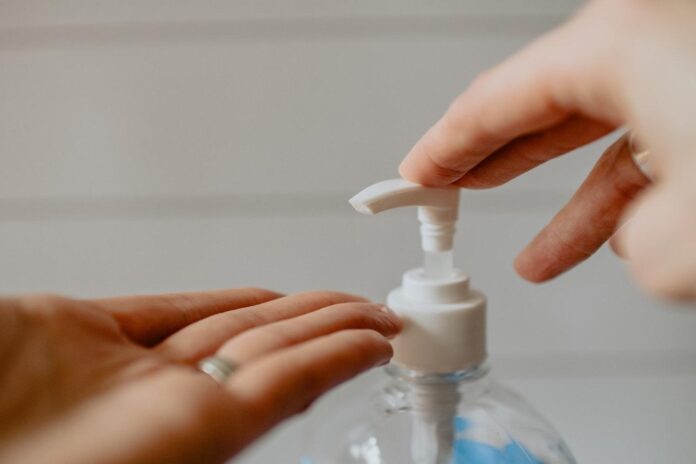Most hand sanitisers available in the local market are ineffective against coronavirus as they contain 30 per cent alcohol by volume (ABV) as compared to the required 70 per cent ABV, and the lack of oversight has permitted this practice to go unchecked for a while.
Recently, the federal cabinet bypassed the rules of Drug Regulatory Authority of Pakistan (DRAP) and mandated the Ministry of Science and Technology (MoST) to monitor the manufacturing of hand sanitisers, which paved the way for the supply of substandard products to local pharmacies and stores.
Globally, pharmaceutical companies are leading the way in the manufacturing of hand sanitizers as per the guidelines of the World Health Organisation (WHO), but in Pakistan, a large number of cosmetic companies and even shopkeepers have started manufacturing hand sanitisers with less alcohol content. The global health body recommends that only qualified and authorised companies should make hand sanitisers because substandard products can not only be ineffective against germs and viruses but they can also cause skin burns.
Well-informed sources told Pakistan Today that soon after the coronavirus outbreak, cosmetic companies in Pakistan wanted to get into the manufacturing of hand sanitisers and to avoid strict oversight, they wanted a weak organisation like the Pakistan Standard and Quality Control Authority (PSQCA) to handle the licencing and monitoring instead of DRAP, as the latter has legal powers to impose heavy fines or award punishment for selling substandard items. PSQCA, an attached department of MoST, has no legal powers in this regard and it can only report violation of standards to relevant police stations and file cases before the judicial magistrate.
On the condition of anonymity, an official of the MoST told Pakistan Today that in order avoid punishment and fines, the Cosmetic Association of Pakistan approached political figures, who finally handed over the mandate to PSQCA, which itself is questionable, because as per the DRAP Act, 2012, the federal cabinet does not have the authority to intervene in the domain of DRAP.
The official said that since licencing and monitoring of such items involves kickbacks and corruption, the high-ups of the MoST convinced the federal cabinet to hand over the subject to PSQCA despite the fact that it has been unable to ensure the quality and standard of 120 items which fall under its domain.
The official also said that not a single pharmacist or qualified person is available to test hand sanitisers at PSQCA and this has allowed cosmetic companies to continue manufacturing them without regulatory oversight. Besides, the official added, most of these cosmetic companies manufacture their original products without qualified staff and they definitely lack the infrastructure and qualified chemists and pharmacists to manufacture hand sanitisers.
According to experts, hand sanitisers are regulated as over-the-counter (non-prescription) drugs under DRAP Rules, 2012, and relevant regulatory authorities across the world. For using alcohol-based hand sanitisers, it is important to read and follow the drug facts label, particularly the warnings section.
To address their supply shortage, WHO recently developed multiple guidelines for emergency preparation of hand sanitisers by pharmacies and other companies, and in line with their guidelines, DRAP also issued a notification outlining how they need to be manufactured. Noteworthy among all these guidelines is that it is not recommended that cosmetic companies and general public without expertise manufacture their own sanitisers.
It is important to note here that recently the Young Doctors Association also expressed serious concerns about substandard production of hand sanitisers because of the risk they pose to public health.
FROM DRAP TO PSQCA:
In light of the public health emergency and the dire need for quality hand sanitisers during the Covid-19 pandemic, DRAP, under the Ministry of National Health Services, Regulations & Coordination, had issued a notification (F.No.4-2/2017-DD (H&OTC) (Pt) on April 6, 2020, in exercise of the powers conferred by section 7(c) {ix) of the DRAP Act, 2012 (XXI of 2012) read with rule 3(2)(d) of the Alternative Medicines and Health Products (Enlistment) Rules, 2014, pertaining to the manufacturing of hand sanitisers.
As per the notification, the manufacturers having valid Drug Manufacturing License (DML) or valid Enlistment Certificates (Form-6) with topical or external preparations section may prepare hand sanitisers with specified WHO recommended formulations only on campaign basis for a period of three months with the provisional permission of the Health & OTC Division of DRAP.
However, on May 5, the federal cabinet stopped DRAP from regulating hand sanitisers with a notification (F N. 4-2/2017 DD (H & OTC) on the demand of Pakistan Cosmetic Association. The director general of PSQCA subsequently issued an office order on May 28 saying that “as per direction of federal cabinet, the certification of hand sanitiser will be issued by the PSQCA instead of DRAP”.
According to an official of DRAP, hand sanitisers undoubtedly fall under the domain of the authority. The official said that their head of the department could not resist the orders when the federal cabinet decided to shift the mandate to PSQCA. He said that as per the rules, DRAP had earlier issued over 500 licences to at least 300 companies for manufacturing hand sanitisers, but they were later cancelled as the firms needed to apply for fresh licences from PSQCA.
Sources told Pakistan Today that Federal Minister of Sciences and Technology had been taking special interest in the subject and had convinced the federal cabinet to transfer the subject from DRAP to PSQCA.




